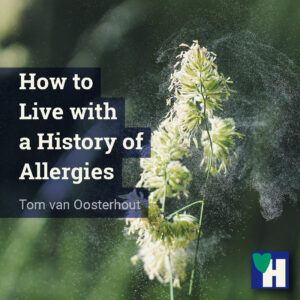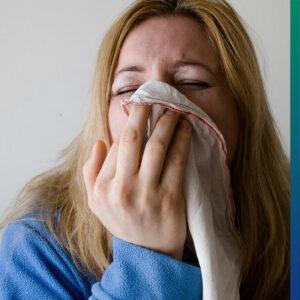
A history of allergies can have a severe impact on our lives. More and more people are diagnosed with allergies. Particularly food allergies are on the rise.
When we visit the food department of the supermarket there are a lot of products on offer without gluten. We all have friends that are afraid of bees or peanuts. A lot of dust in the air makes most of us sneeze.
Allergies are related to many other ailments. How to handle the consequences of allergies is not easy. For people with mild to serious consequences, this is a lifetime job. Moreover, with the current pandemic much more is at stake.
Table of contents
How to control a history of allergies?
The only way to control allergies is by avoiding the allergens causing them. Only very few side-effect-free medications exist to control allergies. A healthy lifestyle with lots of fresh fruits and vegetables supporting your immune system is, however, always good advice.
What are allergies?

An allergy is a hypersensitive reaction of the body’s immune system. There are various types of allergies. The best known are allergies to food and beverages, to pets and insects, to dust and make-up, and to pollen in spring.
The rise of the amount and types of allergies during the past 3 decades in high-income countries is explained by the hygiene theory. This theory suggests that a lack of early childhood exposure to specific microorganisms causes allergies. Genetic predispositions may increase the sensitivity to allergies.
The most severe allergic reaction is called anaphylaxis and may cause premature death. However, almost all people who suffer from an anaphylactic reaction survive. Common causes are bee and insect stings, and medication and food such as groundnuts (peanuts).
Even for goldfish
Allergies come with a lot of physical anxieties. Asthma and bronchitis are both attributed to allergies. In her youth, Hannie was tested for allergies. She was diagnosed to be allergic to almost everything. “Even for goldfish,” I sometimes jokingly remark.
However, allergies are no joke. After prolonged therapy Hannie’s symptoms diminished. At present, she only gets allergic reactions when in the same unventilated room with a cat or dog. These reactions can be quite severe.
There is an extended industry that makes money out of allergies. Another type of industry risks losing a lot of money when allergies keep on rising as they did the last 30 years. Some latter types of industries are peanuts, cosmetics, and dairy products.
Groundnut allergy

Worldwide 44 million tonnes of groundnuts (peanuts) were produced in 2016. In that year the commodity price of groundnuts was reasonably stable at around 1,500 US dollars per ton (1,000 kg). Thus, the total financial turnover for groundnuts in that year was an estimated 66 billion US dollars. With so much money at stake, a groundnut allergy is the last producers, wholesalers and the groundnut butter industry want.
There is a very simple solution to groundnut allergy: gradually feed young children with more and more groundnuts during a period of months to years. This therapy seems to work. However, this is not a serious solution. It only serves commercial interests.
The best prevention, when you suffer from a groundnut allergy, is not to eat them or the products containing groundnuts. Try another nut. The predominant mono-culture of groundnuts is pretty bad anyway.
Mono-cultures deplete the soil. Moreover, pesticides and fungicides are used in abundance in the production of groundnuts, which is a severe threat to biodiversity. This also makes me wonder what the link is between the use of pesticides and fungicides on the one hand and allergies on the other.
Cosmetic allergy

In 2007 the worldwide cosmetic and perfume industry generated a turnover of 170 billion US dollars. No wonder cosmetic and perfume companies are very keen on allergies. A recent study revealed what causes allergic skin reactions to cosmetics.
Common additives in cosmetics trigger itching and redness by destroying skin-fat molecules that control the immune response. The size of these common additives is so small, they easily penetrate the proteins on the surface of the skin, pushing aside the fat molecules. When these molecules are gone, the cells get anxious, alarm the immune system, which incites an allergic reaction.
Don’t use cosmetics when you want to prevent an allergic reaction. There is however a far more important issue at stake. Why is an industry allowed to produce stuff threatening your natural defense systems? Why do we allow people to earn tonnes of money to destroy us?
Milk allergy
It’s no surprise the more money is made in a specific industry, the more important it gets to fight allergies caused by the industry’s products. In 2018 the worldwide production of milk was estimated at 800.000 metric tonnes.
Because milk prices fluctuate frequently it’s hard to calculate the exact total turnover. Moreover, many milk products are sold to consumers way above the price farmers receive. However, setting the average farmers-price per kilo between 0.25 and 0.50 US dollars, the total turnover must be somewhere between 200 and 400 billion US dollars.
To prevent cow milk allergies scientists masked the most important cow milk protein with iron. The idea is that the iron mask fools the body by letting it think that you’re not drinking milk. This stops the allergic response, and might even prevent milk allergies from developing.
Personally, I’m not a big fan of dairy products. They are too disruptive to my digestive system and result in fungus between my toes and behind my ears. Moreover, dairy farming is one of the biggest producers of the high CO2 and methane levels contributing to climate change.
Animal welfare is also not a very high priority for dairy farmers. The average lifespan of a regular production cow is 3 years. The average lifespan of an organic production cow is 8 to 12 years.
A history of allergies and Covid-19 vaccination

At the moment, for those who have a history of allergies, the question is how to handle covid-19 vaccination. The answer is that it depends on how severe your allergic reactions are. If you have only minor allergic reactions, you can proceed with vaccination. However, observe closely how your body responds. Any response that upsets you, is a reason to visit your doctor.
When you suffer from serious allergic reactions, or anaphylaxis, specifically when these reactions are or were caused by other vaccines or an injectable therapy, consult your doctor. Ask her or him to do a risk assessment.
When the assessment gives green light to your vaccination, ask her or him to check your response. Report anything that upsets you. Reporting anything out of the ordinary is a crucial step to ensure your safety and to help your doctor to support you.
How to live with a history of allergies?
Some rules of thumb apply:
- See your doctor when you’re not sure that you suffer from allergic reactions or which allergen is responsible;
- Avoid contact with an allergen is sound advice. Dump all cosmetics and perfumes;
- Medication is often the only way to manage severe allergic reactions. Also, because we cannot always avoid the allergens. It’s almost impossible to avoid pollen;
- Unfortunately, besides the tip to avoid contact with an allergen, no lifestyle advice exists that might help to cope with or prevent allergic reactions. Unless, of course, we want all young children to eat peanuts for months or even years on end;
- Join a support group.
Do you have a history of allergies? Tell us all about it in the comment box.

Hi Tom,
I’m not someone who has had to live with a history of allergies (perhaps barring one), so I can only really speak from personal experience. And an educated guess as well.
However, your explanation of the “hygiene theory” resonates with me, and this is how I always felt that food allergies especially are born.
I can’t imagine that someone is born with a nut allergy, and I have no odea whether this has anything to do with genetics, or being hereditary.
Perhaps, you can enlighten me on that?
But, I always believed that many food allergies come about simply because we are not exposed to certain food items from a young age.
I actually think the same thing can happen later in life.
The human body is an amazing thing, and it’s very good at acclimatising to different factors.
So, even taking something like potatoes as an example – my guess would be that if someone stopped eating potatoes at age 20 and didn’t touch them at all for many years.
They then eat a potato at age 50 (so 30 years later) they would probably be ill and have some type of allergy to it.
This, of course, is just a theory.
My only real allergy is milk (and I guess dairy in general), although I don’t really view it as an allergy.
I can get away with eating cheese and yoghurt, no problem, but cow’s milk and milk chocolate play havoc with my digestive system, and I typically come out in spots if I have them.
However, just watching Joaquin’s comments (which I have seen before, and I’m in awe of his words whenever I see this video again), it makes a lot of sense that a cow’s milk is actually intended for their calves, and potentially not for human consumption.
In fact, I’ve seen and read many times, that once we pass infancy we shouldn’t really be drinking milk anymore.
How much truth there is this, well that’s down to the “experts” to tell us.
A fantastic read as always Tom, and apologies that I don’t have any insight in the various other factors that you’ve mentioned here.
Unfortunately I have no real experience of allergies, so it’s difficult to comprehend how others may feel.
Thanks
Partha
Hi Partha,
Thank you for your comment and compliments.
A history of allergies comes in all kind of varieties. When allergies come and go unnoticed, which happens a lot, there is hardly any problem. Your problems with milk are very common.
Most babies are born with a lactose tolerance, because otherwise they would not be able to digest breast milk. What probably happened, is that this infant lactose tolerance gradually extended with aging, when people started to consume milk from animals.
It’s assumed that this emerged at the time of domestication of cattle, some 5,000 to 10,000 years ago. However, there is substantial scientific evidence that only half of the world’s population tolerates lactose. So, you’re not alone.
Infants are lactose tolerant because their digestive system produces lactase. Lactase breaks down the lactose (a kind of sugar) in the milk. The older we get, the less lactase we produce, the more lactose intolerant we grow. Lactose free products are produced by adding lactase. A practice only common since 1985.
There are infants who do not produce lactase. This is a very serious problem for the infant. This lactase deficiency can be a hereditary thing as well as a malfunction emerging during the prenatal stage, a so-called ‘construction failure’. This partially answers your question.
The other part of the answer is that many people are indeed born with allergies. However, as with lactose intolerance this might also emerge when aging because it simply is the way our bodies develop.
The ‘hygiene theory’ is actually a ‘hypothesis’, stating that a lack of exposure creates an intolerance to all types of micro-organisms. This hypothesis might or might not be true. Children who are breast fed, receive over 600 types of bacteria. You might think that breast fed infants are well protected.
In his magnificent book The Greatest Benefit to Mankind. A Medical History of Humanity from Antiquity to the Present Roy Porter states that “…the public is increasingly neurotic about its health.” I agree. An allergy can be annoying, even dangerous, but the latter rarely gets people in serious trouble because there are sufficient therapies.
I hope you will stay allergy free for the rest of your life.
Stay safe, stay healthy,
Regards,
Tom
Thank you for this comprehensive and detailed look at allergies. People who don’t have allergies (or have mild allergies) don’t always consider that allergies can be debilitating or even deadly. It’s great to see recommendations on how to deal with them. And including the possibility of being allergic to the COVID-19 vaccine is definitely food for thought. Hopefully, this will encourage people to speak up about allergies before receiving it!
Hi Cynthia,
Thank you for your comment and compliments.
One of the major problems with allergies is indeed that people hardly speak up about them. This is partly because people are afraid to get bullied at work. Or even worse, children that are bullied at school.
With a severe allergy there is no way out. You have to explain to prevent getting in trouble. The consequences of an allergy and bullying can cause severe stress. Sometimes resulting in mental disorder.
There are no clear cut indications of any allergies from COVID-19 vaccines. It’s way too early. Let’s hope the vaccines don’t cause any problems. The virus itself is enough of a problem.
Stay safe, stay healthy,
Regards,
Tom
Very interesting article and important to read, especially now that the covid-19 vaccine is out. I do not have many allergies, but the ones I have are quite severe. I am allergic to chemicals (I can’t handle chlorox, for example, it dries my throat and makes me sneeze). I am also very allergic to certain components of vaccinations; and so, vaccinations can be dangerous for me … I also have a mild pollen allergy and I used to be allergic to kittens (not adult cats, interestingly enough, only kittens). Since I volunteered in animal rescue for 20 years that kitten allergy wasn’t convenient, but it didn’t stop me from rescuing and fostering them, and a few years after exposing myself to them over and over, that allergy is gone. I may have – inadvertedly – trained my body to be around kittens without getting allergic reactions 😉
When it’s time for pollen, I find that one or two spoonfuls of coconut oil in the morning helps me handle it much better. I used medicine for a few weeks, but coconut oil seems to work for me too. There is nothing I can do about the chemical and vaccination allergies, they are too strong. I think that my chemical allergy is a “good” allergy, chemicals are bad anyway. This is why I must eat organic fruits. I have not eaten apples in years because they are loaded with pesticides (there are no organic apples where I live), and so I planted my own apple tree, I hope that within a year or two it will give me organic apples 🙂
Hi Christine,
Thank you for your comment and compliments. You’re right, allergic to chemicals is good. Although we shouldn’t forget that our body is one big chemical factory. Fortunately, our corporal chemicals come in very tiny quantities and are well contained.
If everything is allright of course. Allergic reactions are probably a chemical response to a chemical unbalance. Allergies actually prove our body is both agile and fragile. As you noticed with conventional apples.
In a recent article I saw that there are 2 ways to fight cat allergy. The common type of allergy control is to inject people with an antibody that cats smear on their skin during regular tongue baths. Cats smear this antibody on their skin to immunize the allergen for which cats are also allergic!
The latest type of cat allergy control is to mix the antibody in cat food. The cat food destroys the allergen (up to a certain point), helping the cat and its allergic owner.
That you were only allergic to kittens is interesting. I have no idea why. Perhaps the kittens don’t produce enough antibodies yet?
I hope you grow enough organic apples to last you a lifetime.
Stay safe, stay healthy.
Regards,
Tom
Hi Tom.
I have had a lot of experience with allergies.
As a baby, I was often very sick with asthma, bronchitis, and was allergies. These issues followed me for many years growing up, and it wasn’t until I was extensively tested at around age 14 that we discovered that dairy products and pollens were the main culprits.
It’s interesting that I ‘grew out of’ asthma and bronchitis in my early teens, but still am mildly susceptible to having allergic reactions to pollens, dust, pollutions, and animals.
I enjoy watching the parent’s reactions when their young kids stuff anything and everything into their mouths. It cracks me up. The parents consider it ‘dirty and unhygienic’ whereas the kids instinctively know that this is how they develop strong and healthy immune systems.
In the same way, the sooner we are all exposed to ‘the virus,’ the sooner we will develop herd immunity, and then we can all get back to living our lives! Our bodies are so amazing, incredibly robust, and intelligent beyond belief. It is only when our immune systems are weak that we are suspectable to disease and prone to sickness (as mine was when I was a baby.)
I love the way Joaquin Phoenix used his words in the video. It gave me a lot of respect for him.
Many thanks for sharing.
Hi Andrew,
Your comment landed in our spam map for undisclosed reasons. That’s why I’m a little late with my reply. Sorry about that.
Thanks for your comment. Your allergy history sounds a lot like Hannie’s. She also suffered from asthma and bronchitis when she was a child. It took her years to get rid of the most severe consequences of the allergies, which always seem to accompany asthma and bronchitis. And still today, when she enters a house whit cats after some 10 minutes she starts to sneeze.
Although I share your optimism about our adaptive capacities, there remain some serious threats to our bodies. Diphtheria, tyfus, polio, malaria are examples of ailments we better avoid, even when our immune system is 100%. I’m also convinced that when we wouldn’t keep our hygiene in check the bubonic plague would return and ravage the population as never before.
We need clean water, sewer systems, and healthy food to strengthen our immune systems, but also to prevent us from getting seriously ill. We also need medication and medical assistance when we, for whatever reason, pick up some contagious or other disease, or when we, to no fault of our own, get injured.
Life is complicated, our bodies are strong, and at the same time very fragile. To maintain a healthy balance is quite a challenge. Not just for us individually, but also for us humans collectively. Moreover, when you imagine how dependent our medication is of natural ingredients, which are grown in rain forests, such as the Amazon.
I’m glad you were able to suppress most of your allergies.
Stay healthy, stay safe.
Regards,
Tom
Hi there, I live in Texas. Due to the weather and vegetation, you can develop allergies when you first come in. I’ve friends that were submitted to six months length medical treatments to cope with it. I think homeopathic products have been a lifesaver. In my experience, it has been impossible for me to keep myself away from the allergen since it is the environment. I think our body can be trained, and I work on my immune system to increase its tolerance.
Hi Nicole,
I’ve never been in Texas. Can you compare the climate over there with that of Florida, Alabama, Arizona, Utah, Nevada or California? These states I visited more than once and I very much enjoyed the climate there. What a disappointment it must be to suffer from allergies in what must be a beautiful state.
As far as I’m aware a six month medical treatment is not uncommon for people suffering from severe allergies. Some treatments take years. And these treatments don’t give any guarantees that you’re allergy-free for the rest of your life.
Never read or heard of any homeopathic products that could minimize an allergy or its consequences. What type of products do you refer to?
You’re right to train your body and work on your immune system. I think that is the best way to cope with allergies.
Thank you for your comment. Stay safe, stay healthy.
Regards,
Tom
Great comprehensive and thorough overview of allergies. I luckily did not have to deal with allergies growing up but in the past few years I have been waking up in the morning congested and coughing (especially during the winter) and I’m not sure what could be causing it. Not sure if this is an allergy or the climate.
There is a documentary on Netflix regarding peanut allergies and it mentioned how the number of children with peanut allergies has skyrocketed in the last few years. They did mention about gradually feeding young children groundnuts and increasing them during a period of months to years.
I also wanted to mention that my wife cut out a lot of dairy as well as vacuumed the house (using a roomba) and this really helped decrease her allergic symptoms.
Thanks for sharing this great info.!
Hi Justin,
Glad you like the article. I’m always impressed when people appreciate the info and thoughts I share.
When you’re in doubt what causes your morning congestion and coughing, consult a doctor. Most people with allergies look forward to the winter time, because then they suffer less. Specifically those that suffer a pollen-allergy.
Food and beverage allergies can affect people the whole year through. This suggests you’re affected by something else. The more the reason to consult your physician.
I’ve never seen the documentary on Netflix. I’m afraid the documentary was planned to appear at the time the research results were published, predominantly benefitting the groundnut producers and peanut butter industry. Feeding children with groundnuts for months and years on end does not sound a proper therapy to me. I suggest children eat some healthy food.
Very clever of your wife to take control of her allergies by acting herself. Although I’ve no idea what a roomba is. Sorry, searched the Internet and in less than a fraction of a millisecond a vacuum cleaning robot appeared. Never tried one. They must be handy. Also because the roomba helps her to control allergic symptoms.
For now, stay safe, stay healthy.
Regards,
Tom
Hi Tom,
This is great information. I had food allergies and could not eat gluten, dairy, and eggs. My body has been so ill that I developed Hashimoto’s thyroiditis. When I started to heal my gut by leaving the food I am allergic to, I began to heal. But I lost quite a lot of weight due to avoiding grains and a combination of grains, fat, and sugar. My intestines have healed, so my whole body and brain. I suffered from severe brain fog.
Actually, after years of avoiding the food I am allergic to, I sometimes have no problems eating some bread. It is because I have given my body a reset by cleansing my gut and the whole body.
Also, I take a high amount of Vitamin D3 with Vitamin K2. This has helped me a lot.
I believe that most people’s gut is damaged, and they suffer from a deficiency of Vitamin D3. It is fascinating! People are overeating and eating the wrong food.
I love your blog! You have me going; I can’t stop commenting. 🙂
Our immune system is a miracle! Amazing how it works! Autoimmune diseases are quite common these days. The industry is allowed to feed us with food that can’t be called food. But we should take our responsibility and avoid this “food”.
The animal industry is criminal in my eyes! We shouldn’t eat meat or dairy from animals who suffer for our consumption.
I wish you a Happy New Year, A Healthy one!
Sylvia
Hi Sylvia,
What a beautiful name for something that can do so much harm. However, I think most autoimmune diseases are terrible.
As I understand it Hashimoto’s thyroiditis is probably hereditary and more common with women than with men. I’m glad though you were able to fight the attack on your health.
Your struggle clearly shows what the impact can be of such a disease. It also shows how we can slowly recover from the harm done when we discipline ourselves into the control of our body. I’m very well aware of the effort such struggle takes.
In many of our articles we try to point out how important food and exercise are to keep our bodies healthy. We also try to explain how difficult it is to maintain the necessary discipline and how important social support is.
Did you had any such support during your struggle? Are there for instance any groups on the Internet that support people suffering from Hashimoto’s thyroiditis?
I admire your candid story and hope your allergies will not harm you too much.
Stay safe, stay healthy.
Regards,
Tom
I am lactose intolerant and my quest for lactose-free products brought me to a vegetarian lifestyle. I said goodbye to meat products as well as I was never a fan… My family never had a history of allergies and they thought I was acting all fancy just to get some attention. The thing is, I would bloat enormously after just one glass of milk. A lactose intolerance test proved I was right so I made the switch to plant-based milk, store bought or homemade.
Hi Samantha,
Did you read my reply to Partha’s comment? That will have evoked a lot of recognition.
I used to say to people who drink milk whether they knew where it originated. They reply: “From the cow!” “That’s not true,” I said, “Milk comes out of a plastic coated carton box, and is produced in a factory. The cow is just a fairy tale.” I always wondered why nobody took me serious.
Hannie eats her smoothies with plant-based milk: almond milk. She likes it. I don’t, because it sticks too much to the inside of my intestines, it gives me a bloated feeling and my stomach bubbles all the time.
Interesting that you can make your plant-based milk at home. Perhaps we should try that.
Thank you for your comment. Brought some new ideas.
Stay safe, stay healthy.
Regards,
Tom